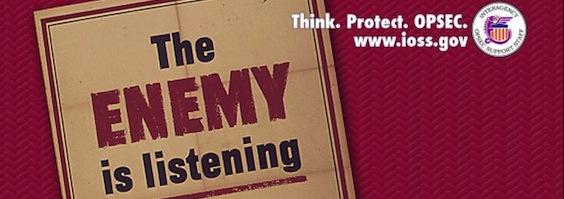Sitting in an eight hour Key Spouse training made me realize that there is a huge push from the top on the proper use and inappropriate abuse of OPSEC . . . that is, operational security information.
Usually, this translates to details of a service member’s mission, TDY or deployment. Mentioning things like numbers of troops, where they’re going, what they’re doing and how long they’ll be gone for is more than just frowned upon, it is verboten.
True, it is important in the military spouse world to cultivate awareness that Joe McTerrorist may be lurking in the shadows of your desktop computer, waiting for hints and morsels that you, the home front spouse, might casually drop.
Yes, it is important that Frank McPredator should be kept at bay with increased virus and firewall software, better passwords and less personally identifiable information.
Most of us know better than to post, “I’m going to be SO LONELY for the next 16 weeks at THIS ADDRESS!”
We’re certainly more clever than to announce, “Only 72 more hours until our homecoming at THIS EXACT LOCATION!”
Most of all, we’re not as idiotic as to post intimate details of the risky and onerous business of war fighting, should our service members choose to make us privy to the non-classified details.
As a community, we’ve gotten fairly good at self-policing those who tend to overindulge sensitive information.
Yet, if you listen to the rhetoric circulated in the military, OPSEC has morphed from “loose lips sink ships” to something entirely different.
Now, in the Age of “Tell No One Nothing About Anything Ever and ESPECIALLY Nothing Military Related,” we’re warned of the hazards of every keystroke online, even something as innocent as an “I Love My Airman” blog badge, or Instagramming a vintage picture of a deployed family blue star pin, or posting a Facebook status on how lonely you feel.
I’m concerned that we’ve self-censored ourselves silent online.
At a time when our wars are ever-more invisible to civilians and lawmakers who send our service members time and again to do the nation’s bidding, have we as a military spouse community gone underground?
When we self-assure ourselves that we’ve hushed up Sally Rumor Spreader or Lily Detail Leaker online, I wonder if we’ve alienated those who truly need an online forum to share their fears, vent their frustrations, find friends and connect to resources.
Humans have a basic, powerful need to connect. Increasingly, this will mean an online connection for many spouse circles. Are we ready to admit as a military spouse community that by expanding OPSEC so vastly that we may cut off those who need the online medium the most as a form of communication?
The public lack of awareness of the unique challenges military families face stems from a long, proud history of tough military spouses who hushed up and soldiered through.
Yet, these historic spouses had more robust officer and enlisted base-run clubs, stronger participation at on-base functions, higher rates of participation in social activities and generally more peer-to-peer accountability. Was it perfect? No. Yet, safe spaces existed for conversations to flow.
As the military spouse community evolves, embracing military spouse online activity as a healthy, critical component of spouse resiliency is just as important as enforcing OPSEC rules.
Sarah writes about life in the US Air Force, raising a Jewish family and interfaith marriage. She lives in Tucson with her husband, son and daughter. Her idea of perfection is walking her dog, reading in a hammock and eating breakfast tacos. She has a BA in Political Science and Chinese and a Masters in Public Affairs.









